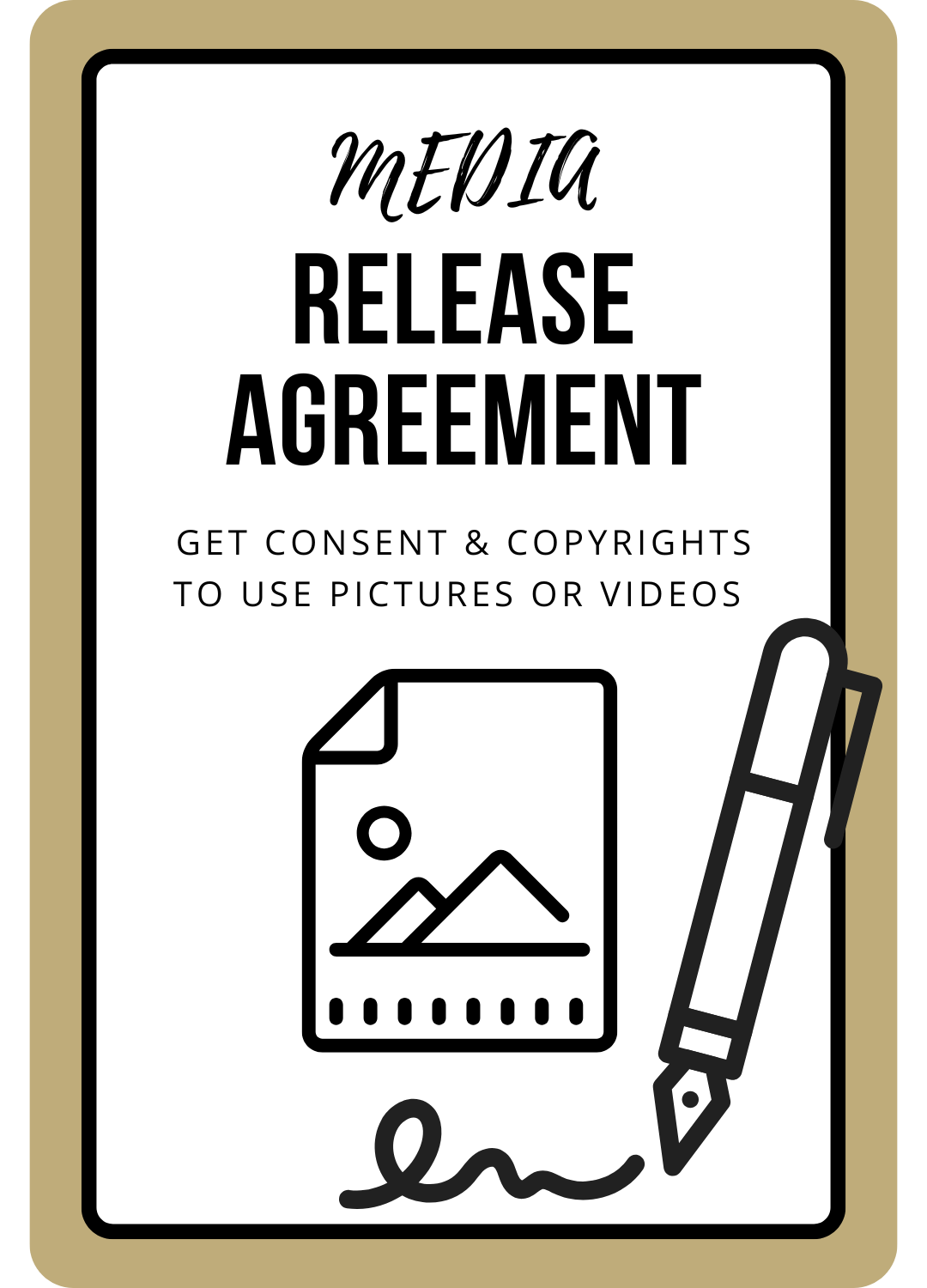10 Key Reasons to Always Use a Photo Release Consent Form for Social Media (and Avoid Costly Mistakes)
Do you really need a photo release consent form for social media before posting someone else’s image?
Absolutely — and skipping it could land you in serious legal and financial trouble.
If you’re anything like me, you share photos online to connect with your audience, promote your work, or build your brand — but as a lawyer who has created a release form template for creators and entrepreneurs like you, I can tell you that posting without consent is one of the easiest ways to damage your reputation and invite disputes.
In this blog post, you’ll learn:
The top 10 reasons to use a photo release consent form for social media online
Why even “friendly” collaborations need a social media release form signed
How the right photo release consent form protects you from platform takedowns, privacy claims, and unexpected payment demands
By the end, you’ll know exactly what risks you’re avoiding, how to safeguard your content, and where to get a ready-to-use release form that covers photos, videos, and more — so you can post with complete peace of mind.
This post is all about the photo release consent form for social media — to keep you legally compliant, protect your brand, and give you confidence every time you post.
Essential Photo Release Consent Form for Social Media
The 10 Key Reasons You Need a Photo Release Consent Form for Social Media
1. Compliance with Privacy Laws
Problem: People have legal rights over their likeness under privacy and publicity laws.
Risk: Without written photo release consent form for social media, you’re violating those rights and could be forced to remove the photo from social media — or face legal action.
Practical Example: Imagine you post an event photo with attendees in the background. One person sees themselves in your post, complains you didn’t have their permission, and demands you delete every trace — even from ads, Reels, and Stories.
Solution: A signed release proves you have permission, protecting you if the issue ever ends up in court. My Social Media Release Form is drafted to meet privacy law requirements, so you’re covered from day one.
2. Compliance with Social Media Platform Rules
Problem: Platforms like Instagram, Facebook, and TikTok require you to have rights to all posted content.
Risk: If someone complains and you can’t prove consent, your post could be taken down, or worse — your account suspended.
Practical Example: You post a client testimonial photo on Instagram. They later change their mind, report it to Instagram, and the platform removes your post and flags your account.
Solution: With a signed social media consent form, you can prove your rights to the platform and avoid account penalties.
3. Written Authorisation (Not Just Verbal Consent)
Problem: “They said it was fine” doesn’t hold up legally.
Risk: Without a written agreement, it’s your word against theirs in court — and you could lose.
Practical Example: An acquaintance agrees verbally to let you post their photo. Months later, after a falling-out, they demand you remove it — claiming they never gave permission.
Solution: My Photo Consent Form gives you solid, written proof that protects you long after the photo goes live.
4. Protection Against Liability Claims
Problem: People can and do change their minds.
Risk: Without clear terms, they could sue you or demand damages after you’ve already used their image.
Practical Example: You feature a local artist in your social media campaign. A year later, after the campaign goes viral, they claim you’re profiting from their image without fair payment.
Solution: A signed photo release consent form for social media locks in the rights granted, so they can’t retract them without cause.
5. Clear Communication of Rights
Problem: If you don’t spell out what’s allowed, misunderstandings are inevitable.
Risk: Disputes can arise over editing, filters, ad use, or how long the photo stays online.
Practical Example: You post a brand photo of a model. Later, they’re upset you cropped the image and used it in a sponsored post — because you never clarified you could.
Solution: My Social Media Consent Form Template clearly sets usage terms in plain English. It clearly outlines (in plain English) how, where, and for how long, so both parties know exactly what’s permitted. And here’s why it’s relevant for both sides of the coin:
If you’re the one using a photo of someone else, you can clearly state all the different purposes you can use the photo for so that you have complete freedom to use the photo however you want.
If you’re the one granting the rights to your photo, you can control how your photo is used so that your reputation won’t get damaged. You can even restrict certain things, like running ads on your photo.
6. Avoid Paying (Too Much) Later
Problem: Without payment terms in writing, someone can demand more later.
Risk: If the post goes viral, they might ask for royalties or additional fees.
Practical Example: You give a collaborator a free product in exchange for a photo. The post blows up, and they demand $1,000 because you used their image for marketing.
Solution: Your photo release form should explicitly state whether the person is getting compensated or not. And if they’re receiving compensation, what will it be? Cash? The right to use the photo, too? A pair of leggings? It should also clearly state that this person is not entitled to (further) compensation now or in the future (if you’re the one using the photo). My Media Release Form sets clear payment (or no-payment) terms to prevent costly surprises.
7. Show Professionalism and Respect
Problem: Posting without a proper photo release consent form for social media can make you look unprofessional and careless. And anyone in their right mind will appreciate you for taking their rights and privacy seriously.
Risk: You damage relationships with clients, collaborators, and your audience.
Practical Example: You post a behind-the-scenes team photo without checking if everyone’s comfortable. One team member feels disrespected — and your working relationship suffers.
Solution: Having a signed photo release form shows you take privacy seriously, building trust and credibility.
8. Advertising and Promotion Protection
Problem: Using an image in ads is a whole different level of risk. Explicit permission specifically for social media ads is an absolute must.
Risk: Without explicit ad consent, you could be liable for royalties or legal claims. That’s also why you need to clearly state that the compensation they receive (if any) is the only compensation. And if such a purpose is not explicitly stated in the social media consent form, they will be entitled to (further) compensation.
Practical Example: You boost a post featuring a model. They see it’s being used in paid ads and demand a percentage of ad revenue.
Solution: My Photo Release Form Template includes ad-use clauses and clear compensation limits so you can run campaigns without worrying about takedown claims or demands for (more) compensation.
9. Minors and Sensitive Content
Problem: Two specific types of content require extra caution:
Photos of minors, which require parental consent.
And photos that contain sensitive or controversial content.
Risk: Posting without proper consent can lead to legal trouble and public backlash. You will need explicit approval to avoid backlash, as you will be extra vulnerable to claims and disputes.
Practical Example: You share a touching photo of a child at an event and post it. However, you didn’t get their parent to sign a photo release consent form for social media. They demand its removal and threaten legal action.
Solution: My Social Media Consent Form Template includes parental consent and sensitive-content clauses to cover high-risk situations.
10. Future-Proofing Your Content
Problem: You may want to reuse the image for future projects beyond social media.
Risk: Without broad usage rights set out in a photo release consent form for social media, you’ll need new permission every time you use the image for something else.
Practical Example: A year after a campaign, you want to use the same image for a website banner — but can’t find the person to get consent for that type of use specifically.
Solution: My Media Release Form covers multiple platforms and purposes — not just social media — so you can repurpose content freely. It ensures you don’t have to keep requesting permission for future uses.
These are all the reasons you need a photo release consent form for social media to protect yourself and your business!
The Ultimate Photo Release Consent Form for Social Media Template Free of Fluff!
Skipping a photo release consent form for social media might seem harmless, but as you’ve just seen, it can open the door to takedowns, disputes, legal claims, and unexpected costs. All it takes is one person objecting to their image being used to turn a harmless post into a stressful (and expensive) problem.
The good news? Protecting yourself is fast and easy with a solid photo release consent form for social media — one that covers photos, videos, audio, and even written content, and is drafted with the exact clauses you need to stay compliant and confident.
My Media Release Form is:
✅ Lawyer-drafted for maximum protection
✅ Flexible for social media, websites, ads, and future projects
✅ Easy to customize for any person, brand, or campaign
✅ Designed to save you from costly disputes down the road
Don’t wait until someone files a complaint or demands payment — get your Media Release Form today and post with complete peace of mind.
➡ Get your Media Release Form now!
This post was all about the key reasons you need a photo release consent form for social media to avoid major issues.
To learn more about what mistakes to avoid and what you need in a media release form, read these next blog posts:





